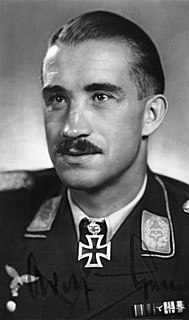A Quote by Sun Tzu
By altering his arrangements and changing his plans, the skillful general keeps the enemy without definite knowledge. By shifting his camp and taking circuitous routes, he prevents the enemy from anticipating his purpose. At the critical moment, the leader of an army acts like one who has climbed up a height and then kicks away the ladder behind him.
Related Quotes
How much reverence has a noble man for his enemies!--and such reverence is a bridge to love.--For he desires his enemy for himself, as his mark of distinction; he can endure no other enemy than one in whom there is nothing to despise and very much to honor! In contrast to this, picture "the enemy" as the man of ressentiment conceives him--and here precisely is his deed, his creation: he has conceived "the evil enemy," "the Evil One," and this in fact is his basic concept, from which he then evolves, as an afterthought and pendant, a "good one"--himself!
A man who gives way to his passions is like a man who is shot by an enemy, catches the arrow in his hands, and then plunges it into his own heart. A man who is resisting his passions is like a man who is shot by an enemy, and although the arrow hits him, it does not seriously wound him because he is wearing a breastplate. But the man who is uprooting his passions is like a man who is shot by an enemy, but who strikes the arrow and shatters it or turns it back into his enemies heart.
Man's desire for the approval of his fellows is so strong, his dread of their censure so violent, that he himself has brought his enemy (conscience) within his gates; and it keeps watch over him, vigilant always in the interests of its master to crush any half-formed desire to break away from the herd.
Whoever is the first in the field and awaits the coming of the enemy will be fresh for the fight... Therefore the clever combatant imposes his will on the enemy... By holding out advantages to him, he can cause the enemy to approach of his own accord; or by inflicting damage, he can make it impossible for the enemy to draw near.
Al Gore’s not going to be rounding up Jews and exterminating them. It is the same tactic, however. You got to have an enemy to fight. And when you have an enemy to fight, then you can unite the entire world behind you, and you seize power. That was Hitler’s plan. His enemy: the Jew. Al Gore’s enemy, the U.N.’s enemy: global warming.
Their element is to attack, to track, to hunt, and to destroy the enemy. Only in this way can the eager and skillful fighter pilot display his ability. Tie him to a narrow and confined task, rob him of his initiative, and you take away from him the best and most valuable qualities he posses: aggressive spirit, joy of action, and the passion of the hunter.
The best athlete wants his opponent at his best. The best general enters the mind of his enemy. The best businessman serves the communal good. The best leader follows the will of the people. All of the embody the virtue of non-competition. Not that they don't love to compete, but they do it in the spirit of play. In this they are like children and in harmony with the Tao.
We're all so clogged with dead ideas passed from generation to generation that even the best of us don't know the way out We invented the Revolution but we don't know how to run it Look everyone wants to keep something from the past a souvenir of the old regime This man decides to keep a painting This one keeps his mistress He [ pointing ] keeps his garden He [ pointing ] keeps his estate He keeps his country house He keeps his factories This man couldn't part with his shipyards This one kept his army and that one keeps his king
The truth is there are a million steps, and we don't even know what the steps are, and worse, at any given moment we may not be willing or even able to take them; and still worse, they are different for you and they are always changing. I have come to believe the sooner we will fall in love with the God who keeps shaking things up, keeps changing the path, keeps rocking the boat to test our faith in Him, teaching us to not rely on easy answers, bullet points, magic mantras, or genies in lamps, but rather in His guidance, His existence, His mercy, and His love.
For my own part I would as soon be descended from that heroic little monkey, who braved his dreaded enemy in order to save the life of his keeper; or from that old baboon, who, descending from the mountains, carried away in triumph his young comrade from a crowd of astonished dogs-as from a savage who delights to torture his enemies, offers up bloody sacrifices, practices infanticide without remorse, treats his wives like slaves, knows no decency, and is haunted by the grossest superstitions.
We must carry the war into every corner the enemy happens to carry it, to his home, to his centers of entertainment: a total war. It is necessary to prevent him from having a moment of peace, a quiet moment outside his barracks or even inside; we must attack him wherever he may be, make him feel like a cornered beast wherever he may move. Then his moral fiber shall begin to decline, but we shall notice how the signs of decadence begin to disappear.
Once committed to fight, cut. Everything else is secondary. Cut. That is your duty, your purpose, your hunger. There is no rule more important, no commitment that overrides that one. Cut. Cut from the void, not from bewilderment. Cut the enemy as quickly and directly as possible. Cut decisively, resolutely. Cut into the enemy’s strength. Flow through the gaps in his guard. Cut him. Cut him down utterly. Don’t allow him a breath. Crush him. Cut him without mercy to the depths of his spirit." -Richard Rahl




































